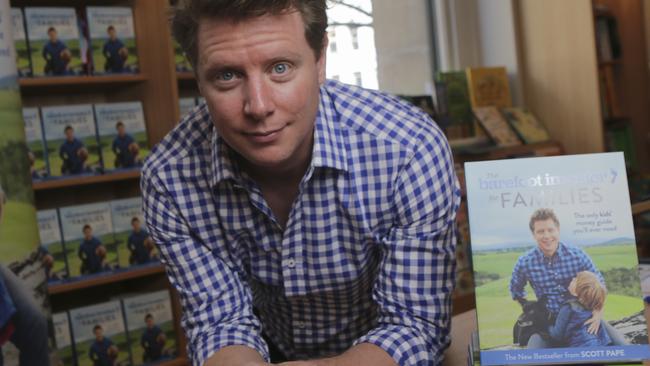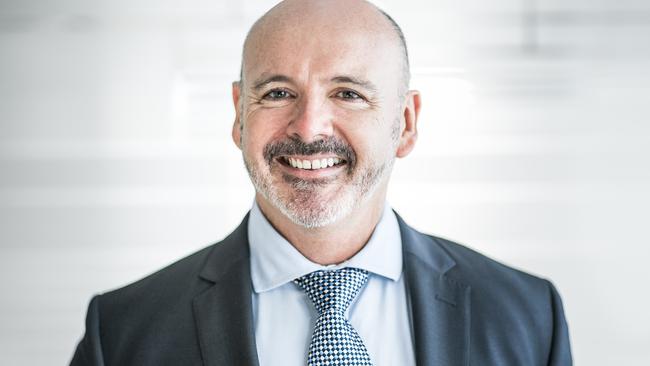Barefoot Investor: Why school holidays and creating family memories shouldn’t cost a fortune
As parents, we can get stuck on the idea that we need to spend a lot of money — especially in the school holidays — to create memories with our kids. But that’s not true, writes the Barefoot Investor.

Barefoot Investor
Don't miss out on the headlines from Barefoot Investor. Followed categories will be added to My News.
I am back! I spent the school holidays roughing it. (No, really.)
I went on a father and sons trip, camped out in a national park and let the kids range free. The boys climbed trees, fell out of trees, and ate damper on sticks that weren’t first thoroughly disinfected with wipes.
It was sensational … and also a bit loose. One morning I sent Liz a picture of the boys warming themselves around the morning campfire.
“Put their jackets on and get them each a beanie or they’ll catch a cold!” screamed the reply text. (Terri Irwin she ain’t.)
KIDS MORE ADDICTED TO DEVICES FROM A YOUNG AGE

As we made our way home, the boys were clearly impressed with squeezing into a tent, doing their business behind a tree and not showering.
“This was the best holiday ever”, announced my six-year-old.
“The best EVER”, parroted his three-year-old brother.
“The best ever?! But what about the time we went to Fiji and I chartered that boat with the marine biologist (which cost me $400)? Or when we hired that villa in Bali and went to the water park?”
Blank stares in the back seat.
“Can we go through McDonald’s drive-through on the way home?”
“Yes … but don’t tell your mother.”
As parents we can get stuck on the idea that we need to spend a lot of money — especially in the school holidays — to create memories with our kids. Yet what they really want hasn’t changed that much in generations: outdoor fun and uninterrupted time with their parents.

Case in point: this week the World Health Organisation recommended that kids under five should have no more than one hour of screen time per day.
(What that means for us adults, who spend eight hours a day glued to our screens at work, and then thumb through Instagram until our heads hit the hay, is a class-action suit for another day.)
Still, Silicon Valley tech millionaires — who got rich getting us all hooked on screens — worked this out long ago: Bill Gates didn’t let his kids get a mobile phone until they were 14, and Steve Jobs famously wouldn’t let his kids near an iPad. And in Silicon Valley some of the most popular schools are those that are screen free.
In a world of increasing distraction, technology and busyness … parents are still the killer app!
Tread your own path!
ING IS NOT ETHICAL
JANICE SAYS: Love your work. However, I was disappointed to see a news piece in the weekend paper about super funds being less than transparent about their ethics. I was also disappointed to discover that ING (which you recommend in your book) invests in coal. Saving money is important to me, but so is using my money ethically. So, my question is: can you recommend a truly ethical super fund and bank? And could you consider taking ethics into account when you make recommendations?
BAREFOOT REPLIES: Can I recommend an ethical super fund and bank? No, I can’t.
It would be unethical of me to presuppose other people’s ethics.
Some people are like you — they really care about the environment. Others couldn’t give a Clive Palmer.
My job is to educate, empower and find the best deals without fear or favour.
Then you — the end user — should apply your own criteria.
And that’s why I don’t rate ethical or socially responsible investments.

The article you mentioned cited research from an environmental group called Market Forces, which found that some ethical super fund options, from the likes of Hostplus, CareSuper and AMP, don’t disclose the companies they invest in. For example, AMP’s ethical fund holds fossil fuel mining company stocks.
Then again, AMP argued that it “only represents 2 per cent of the portfolio”.
Interesting rebuttal.
That’s like dating what you think was a straitlaced marrying type, only to find he’s just gone on a week-long crystal meth bender. “But I only get on the gear when my bro Tino is in town! It’s, like, 2 per cent of my year. I’m totally legit 98 per cent of the time, babe.”
Right.
My main tofu with ethical funds is not about what they invest in, but that most are free range in how they charge.
“A sizeable number of ‘sustainable’ funds produce sub-optimal returns at relatively high fee levels,” according to SuperRatings.
Personally, I’d rather invest in a low-cost fund and be tens of thousands of dollars better off. Then I can choose to donate the difference to causes I care about. Then again, they’re my ethics, not yours!
BANK SWANNS AROUND
LOUISE ASKS: I am having all sorts of problems trying to cancel the credit card insurance that was added to my St George credit card when I first took it out. I was told that, as I was a single mum, I would not get the card without it. It is just under $90 a month! I cancelled it more than a month ago and they are still debiting my card. St George says it’s not them and to call Swann Insurance, which says it’s not them. In the meantime it has overdrawn my account. Please help.
BAREFOOT REPLIES: The St George Bank website says: “Please note Credit Card Protect is no longer sold.”
Do you know why they’ve stopped selling it?
It’s not because for years it was known in the industry as “junk insurance” and was hard-sold to unsuspecting customers. That’s exactly why they sold it in the first place. ‒ They made a fortune out of it!
No, the reason the banks stopped flogging it is because it got the royal commission treatment and, as a result, banks and insurance companies could be looking at stumping up more than $1 billion in refunds.

The Consumer Action Law Centre has set up a free website that makes it easy to claim: demandarefund.com
Yet you don’t have time to wait.
I can’t imagine how distressing this must be for you. You’re a struggling single parent who has done the right thing, but still your account has been overdrawn over Easter … and then probably been hit with more fees!
And it sounds like they’re giving you the run-around: I mean, who cares about a lowly single mother, right?
So let’s you and I take this to the top.
Ross Miller is the general manager of St George Bank.
Here’s an old party trick: when you mention a bank executive’s name in print, it pops up in their media tracking service. Which means this column will soon land on his desk.
So, Ross Miller, I think you should refund this single mother all the outrageously expensive premiums she’s paid, plus any overdrawn fees or penalties.
Over to you, Ross Miller of St George Bank.
THE KIND LANDLORD
JANE ASKS: I would like to tell you about one of our tenants.
She was an excellent tenant for four years, but fell behind during the past year and was not able to claw her way back. So I gave her a copy of your book and in the past eight weeks she has paid her arrears in full, and even started saving for a house deposit.
But what made me cry was what she told me next. Her son’s marriage breakup had left him in serious home loan arrears, with the bank threatening foreclosure — and he also lost custody of his children.
He had attempted suicide twice in a week and his survival could only be described as fate. He rang his mum to ask whether she could stay with him for the weekend. Armed with knowledge from your book, she worked with him through his finances.
He has now been able to pay all his arrears and overdue bills, and can focus on repairing himself emotionally.
Your book has helped millions of people with their money. But in this case I think the effect has been rather more profound — with two households at risk of losing everything being able to stay in their homes.
BAREFOOT REPLIES: As the election gets into full swing, it feels like landlords are being unfairly demonised as the enemy of the renter. Not you.
Thanks for sharing.
If you have a burning money question, go to barefootinvestor.com and #askbarefoot. The Barefoot Investor holds an Australian Financial Services Licence (302081). This is general advice only. It should not replace individual, independent, personal financial advice.
The Barefoot Investor for Families: The Only Kids’ Money Guide You’ll Ever Need (Harper Collins) RRP $29.95
Originally published as Barefoot Investor: Why school holidays and creating family memories shouldn’t cost a fortune


